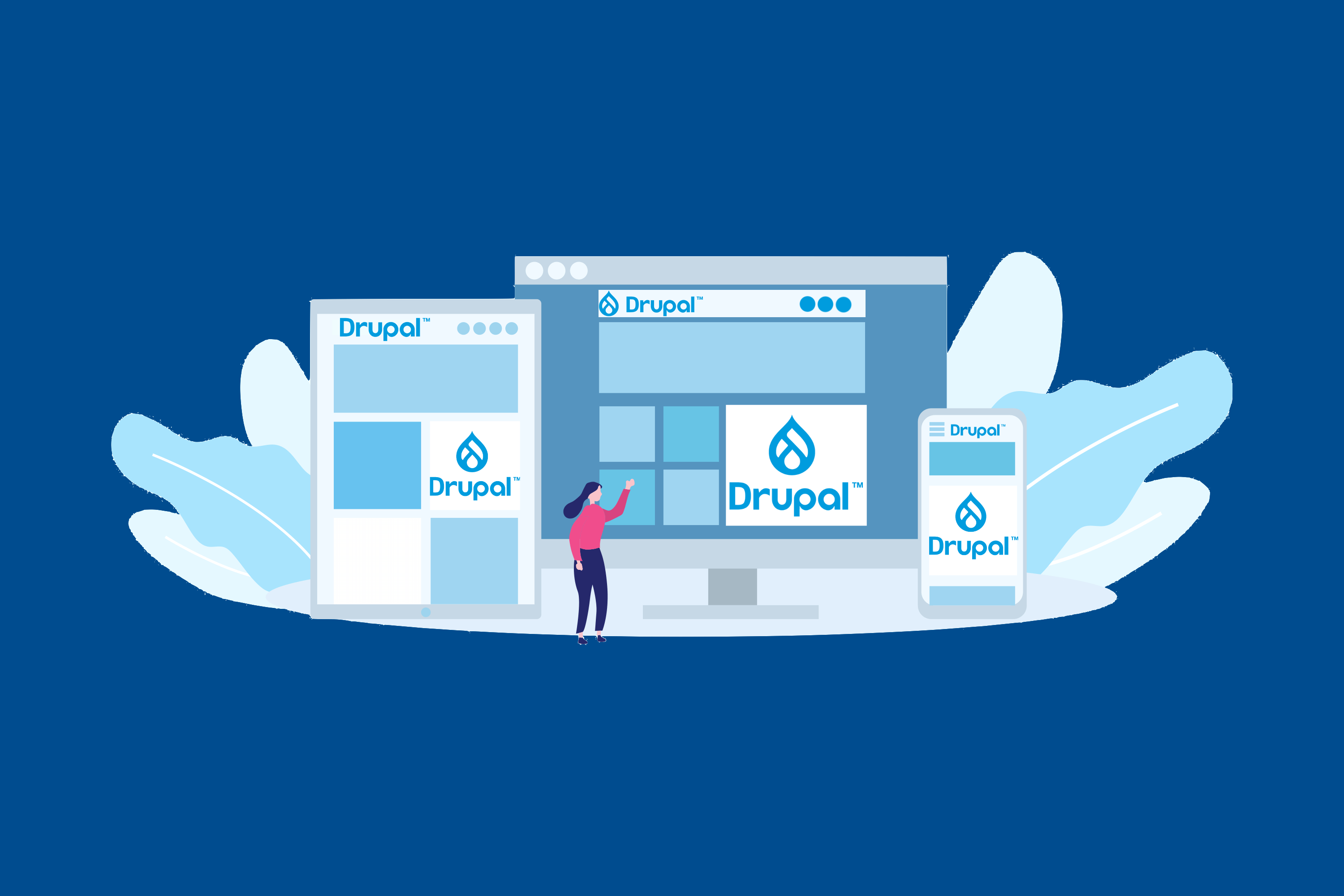eCommerce AI | Web Apps | AR/VR Software – ECA Tech
- Home
- Drupal Programmer: 10+ Best Reasons You Need One
Drupal Programmer: 10+ Best Reasons You Need One

October 25, 2024 - Technology
Unlocking the Potential of Your Website: The Essential Role of a Drupal Programmer
In the world of web development, few platforms offer the flexibility and robustness of Drupal. As an open-source content management system (CMS), Drupal powers millions of websites, ranging from simple blogs to complex enterprise applications. The backbone of these successful sites is often a skilled Drupal programmer, who can harness the full potential of the platform to create tailor-made solutions that meet specific business needs. This article will explore the multifaceted role of a Drupal programmer, the benefits of choosing Drupal as your CMS, and how to select the right programmer for your project.
- Multifaceted
- Flexible
- Scalable
- Robust
Understanding Drupal
Before diving into the specifics of what a Drupal programmer can do, it’s important to understand what Drupal is and why it’s an excellent choice for many organizations.
What is Drupal?
Drupal is a powerful open-source CMS that allows users to create and manage content easily. With its flexible architecture, Drupal can be customized to fit a wide range of use cases. Whether you need a simple website for a small business or a complex application for a multinational corporation, Drupal has the capabilities to support your vision.
Why Choose Drupal?
- Flexibility: Drupal’s modular architecture allows for extensive customization. Users can enable or disable modules as needed, tailoring the site to their unique requirements.
- Scalability: As your business grows, so can your Drupal site. The platform can handle high traffic volumes and large amounts of content without sacrificing performance.
- Security: With a dedicated security team and a community that actively monitors vulnerabilities, Drupal is considered one of the most secure CMS options available.
- Community Support: The active Drupal community contributes to an extensive repository of modules, themes, and documentation, making it easier for programmers to develop solutions.
- SEO-Friendly: Drupal provides built-in features and modules that help enhance search engine optimization, making it easier for your site to rank well on search engines.
The Role of a Drupal Programmer
A Drupal programmer wears many hats, each essential for building and maintaining a successful website. Below are some of the primary responsibilities and tasks typically handled by a Drupal programmer:
1. Site Architecture and Planning
Before any development begins, a Drupal programmer must engage in site architecture and planning. This involves understanding the business requirements and defining how content will be structured and organized. The programmer will create a blueprint that outlines:
- Content Types: Defining various content types (e.g., articles, blogs, events) based on the site’s needs.
- Taxonomy: Organizing content with tags and categories for better navigation and searchability.
- User Roles and Permissions: Establishing user roles (e.g., administrator, editor, contributor) and defining what each role can access or edit.
2. Custom Module Development
While Drupal comes with numerous built-in features, many businesses require custom functionalities that aren’t available out of the box. This is where the skills of a Drupal programmer come into play. They can develop custom modules that add unique features tailored to specific business needs.
For example, a company might need a custom booking system for events. A Drupal programmer can create a module that handles reservations, payment processing, and user notifications, integrating seamlessly with the rest of the Drupal site.
3. Theming and Frontend Development
A Drupal programmer often collaborates with designers to implement the site’s visual design through theming. They ensure that the site is not only visually appealing but also responsive and user-friendly. This involves:
- Creating or Modifying Themes: Drupal programmers can create custom themes or modify existing ones to match the brand’s identity.
- Responsive Design: Ensuring the website is mobile-friendly and provides a great user experience on various devices.
- Frontend Development: Writing HTML, CSS, and JavaScript to bring designs to life and enhance user interaction.
4. Performance Optimization
Performance is crucial for any website. A skilled Drupal programmer will regularly conduct performance audits and implement optimizations to ensure that the site loads quickly and runs efficiently. This may involve:
- Caching Strategies: Implementing caching mechanisms to reduce server load and improve response times.
- Image Optimization: Using tools and techniques to optimize images without sacrificing quality, reducing page load times.
- Database Optimization: Ensuring the database is optimized for quick data retrieval, which is critical for sites with large volumes of content.
5. Security Measures
Security is a significant concern for any website, particularly those handling sensitive information. A proficient Drupal programmer will implement various security measures to protect the site from vulnerabilities, including:
- Regular Updates: Keeping Drupal core and modules updated to the latest versions to patch known vulnerabilities.
- User Access Control: Establishing strict user roles and permissions to limit access to sensitive areas of the site.
- Security Modules: Utilizing security-focused modules like Security Kit and Paranoia to add additional layers of protection.
6. SEO Best Practices
Search engine optimization (SEO) is crucial for driving traffic to your site. A Drupal programmer can help ensure that the site is optimized for search engines by:
- Implementing SEO Modules: Utilizing popular modules like Pathauto and Metatag to create SEO-friendly URLs and meta tags automatically.
- Content Structuring: Structuring content to include headings, subheadings, and other SEO best practices, making it easier for search engines to crawl.
- Performance Optimization: As mentioned earlier, faster sites tend to rank better, so performance optimizations indirectly contribute to SEO.
The Benefits of Hiring a Drupal Programmer
Investing in a Drupal programmer can bring numerous benefits to your organization, including:
1. Expertise in Best Practices
A Drupal programmer brings valuable expertise and knowledge about best practices for development, security, and optimization. Their experience ensures that your site adheres to industry standards and runs smoothly.
2. Custom Solutions
Every business is unique, and a Drupal programmer can tailor solutions specifically to your needs. Whether it’s a custom module or a unique design, their skills can turn your vision into reality.
3. Time and Cost Efficiency
While hiring a programmer may seem like an additional expense, it can save you time and money in the long run. A skilled programmer can identify potential issues before they become significant problems, reducing the risk of costly downtime or rework.
4. Ongoing Support and Maintenance
The digital landscape is constantly evolving, and ongoing support is crucial for maintaining your site. A dedicated Drupal programmer can provide continuous maintenance, updates, and troubleshooting, ensuring your site remains functional and secure.
5. Enhanced User Experience
A Drupal programmer can help create a seamless and enjoyable user experience, leading to higher engagement, lower bounce rates, and increased conversions.
How to Choose the Right Drupal Programmer
Finding the right Drupal programmer for your project is essential for its success. Here are some key factors to consider during your search:
1. Experience and Expertise
Look for a programmer with a solid background in Drupal development. Check their portfolio to see examples of previous work and assess their familiarity with different modules and functionalities.
2. Problem-Solving Skills
A good Drupal programmer should possess strong problem-solving skills, as development often involves troubleshooting and overcoming challenges. Ask about how they’ve handled complex issues in the past.
3. Communication Skills
Effective communication is key to a successful working relationship. Ensure that the programmer can explain technical concepts in a way that makes sense to you and can actively engage in discussions about your project.
4. Understanding of Your Business
A programmer who understands your industry and business goals will be better equipped to create tailored solutions. Look for someone who takes the time to learn about your specific needs.
5. Ongoing Support and Maintenance Options
Consider whether the programmer offers ongoing support and maintenance services after the project is completed. A long-term relationship can help ensure your site remains up-to-date and secure.
Conclusion
The role of a Drupal programmer is critical in unlocking the full potential of your website. From site architecture and custom module development to performance optimization and security measures, a skilled programmer can transform your vision into a reality.
Choosing Drupal as your content management system comes with a wealth of benefits, including flexibility, scalability, and a strong focus on security. With the right programmer, you can leverage these advantages to create a website that meets your unique business needs and stands out in the digital landscape.
Investing in a qualified Drupal programmer not only enhances your website’s performance but also ensures that your site remains competitive in an ever-evolving market. Whether you are starting from scratch or looking to optimize an existing site, partnering with a skilled professional can make all the difference in achieving your online goals.
Ultimately, Drupal offers the tools and flexibility needed to build a robust online presence. By engaging a proficient Drupal programmer, you can harness the platform’s full capabilities, ensuring your website is not just functional but also a powerful asset for your business.

Future trends in drupal development
As businesses and organizations increasingly rely on digital platforms, the demand for advanced website functionalities continues to rise. A skilled Drupal programmer plays a crucial role in integrating these advanced features into your website, ensuring it remains competitive and aligned with emerging trends. One of the standout aspects of Drupal is its capability to support complex functionalities such as content personalization, multi-language support, and robust API integrations.
A proficient programmer can implement content personalization features that enhance user experience by tailoring content based on user behavior, preferences, and demographics. This level of customization not only engages visitors more effectively but also increases conversion rates by presenting relevant content that resonates with the target audience. Furthermore, the multi-language capabilities of Drupal empower businesses to reach global markets, allowing users to switch between languages effortlessly. A Drupal programmer can implement language modules and create custom translations, making it easier for businesses to cater to diverse audiences and expand their reach across different regions.
In addition to personalization and multi-language support, Drupal excels in its ability to integrate with other platforms through APIs. As businesses increasingly utilize various software tools for marketing, customer relationship management (CRM), and data analytics, having a robust API integration becomes essential.
A skilled programmer can seamlessly connect Drupal with external systems, enabling real-time data exchange and improving overall operational efficiency. For instance, integrating Drupal with a CRM system can facilitate automated lead generation, helping businesses manage customer relationships more effectively while ensuring that their website content is always up-to-date.
Moreover, as we look to the future of Drupal development, several trends are emerging that may reshape how programmers approach projects. One of these trends is the growing importance of headless CMS architecture.
In a headless setup, the front end and back end of a website are decoupled, allowing developers to use any technology or framework to build the front end while leveraging Drupal for content management in the back end. This approach offers greater flexibility, enabling businesses to create highly responsive and engaging user experiences that can adapt to different devices and platforms. A proficient Drupal programmer can facilitate the transition to a headless architecture, ensuring that your website remains agile and capable of meeting evolving user demands.
Another trend to watch is the increasing emphasis on accessibility and inclusivity in web development. As regulations surrounding digital accessibility become more stringent, businesses must prioritize creating websites that are accessible to all users, including those with disabilities.
A knowledgeable Drupal programmer understands the principles of accessible design and can implement best practices to ensure that your website complies with accessibility standards. This not only expands your audience but also demonstrates a commitment to inclusivity, enhancing your brand’s reputation.
In conclusion, the role of a Drupal programmer extends far beyond basic website development. As organizations seek to harness advanced features and keep pace with evolving trends, the expertise of a skilled programmer becomes indispensable. From implementing personalized content and multi-language support to embracing headless architecture and ensuring accessibility, a proficient programmer can transform your Drupal site into a powerful digital asset.
By investing in their skills, businesses can unlock new opportunities for engagement, expand their global reach, and ensure that their websites remain competitive in an increasingly digital world. Ultimately, the partnership with a skilled Drupal programmer is not just about building a website; it’s about creating a dynamic platform that can adapt to future challenges and opportunities, positioning your organization for long-term success in the digital landscape.
By clicking Learn More, you’re confirming that you agree with our Terms and Conditions.

FAQ
1. What qualifications should I look for in a Drupal programmer?
When searching for a Drupal programmer, look for qualifications such as:
- Experience: At least 2-3 years of experience in Drupal development, including knowledge of various versions (Drupal 7, 8, and 9).
- Technical Skills: Proficiency in PHP, HTML, CSS, and JavaScript, along with experience in theming and module development.
- Portfolio: A portfolio showcasing previous projects that demonstrate their capabilities in building and customizing Drupal sites.
- Certifications: While not mandatory, certifications in Drupal development can indicate a programmer’s commitment to the platform and their level of expertise.
- Problem-Solving Skills: Ability to troubleshoot issues and provide effective solutions is crucial for successful development.
2. How can a Drupal programmer help improve my website?
A Drupal programmer can enhance your website in various ways, including:
- Customization: Developing custom modules and themes tailored to your specific business needs, providing unique functionalities that out-of-the-box solutions may lack.
- Performance Optimization: Implementing caching strategies, image optimization, and database management to improve site speed and overall performance.
- Security Enhancements: Regularly updating the Drupal core and modules, implementing best security practices, and performing security audits to protect your website from vulnerabilities.
- SEO Optimization: Utilizing SEO best practices and modules to enhance your site’s visibility on search engines, ultimately driving more traffic.
- User Experience: Improving site navigation and overall user experience through responsive design and intuitive interfaces.
3. What is the typical cost of hiring a Drupal programmer?
The cost of hiring a Drupal programmer can vary significantly based on factors such as location, experience level, and project complexity. On average:
- Freelancers: Rates can range from $25 to $150 per hour, depending on their experience and expertise.
- Agencies: Hiring a development agency may cost between $75 and $200 per hour, but agencies often provide a broader range of services and support.
- Project-Based Pricing: For specific projects, programmers may offer a fixed price that can range from a few thousand dollars for small projects to tens of thousands for larger, more complex implementations.
It’s essential to define your project scope clearly to get accurate quotes from potential hires.
4. How long does it take to complete a Drupal project?
The timeline for completing a Drupal project can vary widely based on several factors, including:
- Project Scope: The complexity and size of the project significantly influence the timeline. Simple websites may take a few weeks, while larger, enterprise-level sites can take several months.
- Customization Level: Projects requiring extensive customizations or unique features will take longer than those using standard themes and modules.
- Resources Available: The availability of resources, including the number of team members working on the project, can impact completion time.
A qualified Drupal programmer can provide a more accurate estimate after discussing your specific project requirements.
5. What ongoing support can I expect from a Drupal programmer?
Ongoing support from a Drupal programmer can include:
- Maintenance Services: Regular updates to the Drupal core and modules, ensuring the website remains secure and up to date.
- Troubleshooting and Bug Fixes: Addressing any issues that arise post-launch, including troubleshooting bugs or errors that may impact site functionality.
- Performance Monitoring: Continual monitoring of site performance and making necessary adjustments to maintain optimal loading speeds and user experience.
- Feature Enhancements: Implementing new features or modifications based on user feedback or changing business needs.
When hiring a Drupal programmer, it’s essential to clarify the extent of ongoing support and any associated costs.
6. How do I find the right Drupal programmer for my project?
Finding the right Drupal programmer involves several steps:
- Define Your Needs: Clearly outline your project requirements, including the desired functionalities, timeline, and budget.
- Research: Look for candidates through online job boards, freelance platforms, or Drupal-specific forums and communities.
- Review Portfolios: Evaluate the portfolios of potential candidates to assess their experience and expertise.
- Conduct Interviews: Interview candidates to gauge their technical skills, problem-solving abilities, and communication skills.
- Check References: Ask for references or testimonials from previous clients to understand their work ethic and reliability.
- Start with a Trial Project: If possible, consider starting with a small trial project to evaluate the programmer’s capabilities and compatibility with your team.
By following these steps, you can identify a skilled Drupal programmer who aligns with your project goals and can deliver high-quality results.
